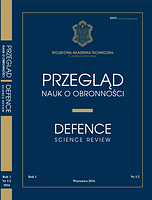Pro-social activities and grassroots initiatives during Russia's attack on Ukraine - institutional field in aid activities for Ukraine (the case of the "Wroclaw Railway Station"
Pro-social activities and grassroots initiatives during Russia's attack on Ukraine - institutional field in aid activities for Ukraine (the case of the "Wroclaw Railway Station"
Author(s): Aleksandra Perchla- WłosikSubject(s): Crowd Psychology: Mass phenomena and political interactions, Russian Aggression against Ukraine
Published by: Wojskowa Akademia Techniczna im. Jarosława Dąbrowskiego
Keywords: institutional field; organisational structure; theory of organisational field; refugees; spontaneous actions of a voluntary; pro-social attitudes;
Summary/Abstract: Objectives:The aim of the article is to determine whether the formation of organisational structures appears in the transformation of grassroots initiatives "coming from the people", in the course of activities for refugees from Ukraine. How to relate the theory of the organisational field to them and what are the possible consequences of institutionalising these endeavours.Methods:For this purpose, observations were made of social media dedicated to volunteer activities at the PKP Main Railway Station in Wrocław and in-depth interviews were conducted with the initiators of these activities and other volunteers. The analysis was also carried out with reference to secondary data results in the form of research reports and statistics.Results:The case study shows that grassroots, spontaneous actions of individuals become networked and then organised, within an organisational field, and that they are not always spontaneous and independent. The article is set in the context of sociologically relevant theoretical paradigms.Conclusions:The cooperation of social organisations with volunteers requires the constant motivation of those involved to continue their activities and the search for new people willing to engage in selfless activity for the benefit of another person. This activity requires knowledge and experience to influence people's decisions to get involved in a way that is appropriate to their beliefs and shared values. This allows us to see the difference between informal self-organisation of citizens and formal civic groups, as the functioning of the latter is specifically regulated by those in power, which influences the effects of their actions.
Journal: Przegląd Nauk o Obronności
- Issue Year: 2022
- Issue No: 15
- Page Range: 161-176
- Page Count: 16
- Language: English

